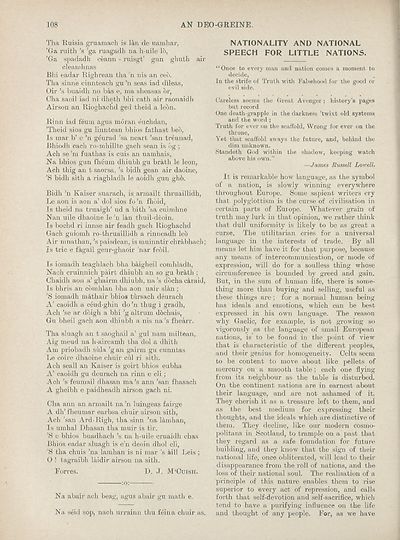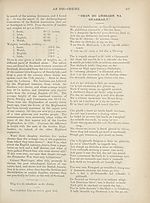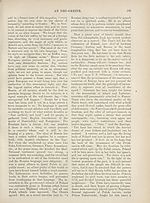An Comunn Gàidhealach Publications > Deo-gréine > Volume 10, October 1914-September 1915
(116) Page 108
Download files
Complete book:
Individual page:
Thumbnail gallery: Grid view | List view

108
AN DEO-GREINE.
Tha Ruisia gruamach is lari de uamhar,
’Ga ruith’s ’ga ruagadh na h-uile lo,
’Ga spadadh eeann - ruisgt’ gun ghutli air
cleamhnas
Bhi eadar Righrean tha ’n nis an ceo.
Tha sinne cinnteach gu ’n seas iad dileas,
Oir’s buaidh no has e, ma sheasas or,
Cha saoil iad ni dheth bhi cath air raonaidh
Airson an Rioghaclid ged theid a leon.
Rinn iad f6um agus moran euchdan,
’Theid sios gu linntean bhios fathast beo,
Is mar b’ e ’n geurad ’sa neart ’san treunad,
Bhiodh each ro-mhillte gach sean is dg ;
Ach se’m fuathas is cuis an uamhais,
Na bhios gun fheum dhiubh gu briith le leon,
Ach thig an t saorsa, ’s bidh gean air daoine,
’S bidh sith a riaghladh le aoidh gun gh6.
Bidh ’n Kaiser suarach, is armailt thruaillidh,
Le aon is aon a’ dol sios fo ’n fhdid,
Is theid na truaigh’ ud a bith ’sa cuimhne
Nan uile dhaoine le ’n Rn thuil-deoin.
Is bochd ri innse air feadh gach Rioghachd
Gach gniomh ro-thruaillidh a rinneadh leo
Air mnathan, ’s paisdean, is muinntir chrabhach;
Is trie e fagail geur-ghaoir ’nar feoil.
Is iomadh teaghlach bha baigheil comhladh,
Nach cruinnich pairt dhiubh an so gu brath ;
Chaidh aon a’ ghairm dhiubh, na’s docha diraid,
Is bhris an comhlan bha aon uair slim;
’S iomadh mathair bhios tursach deurach
A’ caoidh a ceud-ghin do ’n thug i gradh,
Ach ’se ar dbigh a bhi ’g altrum dbchais,
Gu bheil gach aon dhiubh a nis na’s fhearr.
Tha sluagh an t saoghail a’ gul nam miltean,
Aig meud na h-aireamh tha dol a dhitii
Am priobadh sirla ’g an gairm gu cunntas
Le coire dhaoine chuir cul ri sith.
Ach seall an Kaiser is goirt bhios eubha
A’ caoidh gu deurach na rinn e cli;
Ach’s feumail dhasan ma’s ann ’san fhasach
A gheibh e paidheadh airson gach ni.
Cha ann an armailt na ’n luingeas fairge
A dh’ fheumar earbsa chuir airson sith,
Ach ’san Ard-Righ, tha sinn ’na lamhan,
Is umhal Dhasan tha muir is tir.
’S e bhios buadhach’s na h-uile cruaidh chas
Bhios eadar sluagh is e’n deoin dhol cli,
’S tha chuis ’na lamhan is ni mar’s idll Leis ;
O ! tagraibh liiidir airson na sitb.
Forres. D. J. M'Cuish.
Na abair ach beag, agus abair gu math e.
Na seid sop, nach urrainn thu feiha chuir as.
NATIONALITY AND NATIONAL
SPEECH FOR LITTLE NATIONS.
“Once to every man and nation comes a moment to
decide,
In the strife of Truth with Falsehood for the good or
evil side.
Careless seems the Great Avenger ; history’s pages
but record
One death-grapple in the darkness ’twixt old systems
and the word ;
Truth for ever on the scaffold, Wrong for ever on the
throne,
Yet that scaffold sways the future, and, behind the
dim unknown,
Standeth God within the shadow, keeping watch
above his own.”
—James Russell Lowell.
It is remarkable how language, as the symbol
of a nation, is slowly winning everywhere
throughout Europe. Some sapient writers cry
that polyglottism is the curse of civilisation in
certain parts of Euiope. Whatever grain of
truth may lurk in that opinion, we rather think
that dull uniformity is likely to be as great a
curse. The utilitarian cries for a universal
language in the interests of trade. By all
means let him have it for that purpose, because
any means of intercommunication, or mode of
expression, will do for a soulless thing whose
circumference is bounded by greed and gain.
But, in the sum of human life, there is some¬
thing more than buying and selling, useful as
these things are; for a normal human being
has ideals and emotions, which can be best
expressed in his own language. The reason
why Gaelic, for example, is not growing so
vigorously as the language of small European
nations, is to be found in the point of view
that is characteristic of the different peoples,
and their genius for homogeneity. Celts seem
to be content to move about like pellets of
mercury on a smooth table; each one flying
from its neighbour as the table is disturbed.
On the continent nations are in earnest about
their language, and are not ashamed of it.
They cherish it as a treasure left to them, and
as the best medium for expressing their
thoughts, and the ideals which are distinctive of
them. They decline, like our modern cosmo¬
politans in Scotland, to trample on a past that
they regard as a safe foundation for future
building, and they know that the sign of their
national life, once obliterated, will lead to their
disappearance from the roll of nations, and the
loss of their national soul. The realisation of a
principle of this nature enables them to rise
superior to every act of repression, and calls
forth that self-devotion and self-sacrifice, which
tend to have a purifying influence on the life
and thought of any people. For, as we have
AN DEO-GREINE.
Tha Ruisia gruamach is lari de uamhar,
’Ga ruith’s ’ga ruagadh na h-uile lo,
’Ga spadadh eeann - ruisgt’ gun ghutli air
cleamhnas
Bhi eadar Righrean tha ’n nis an ceo.
Tha sinne cinnteach gu ’n seas iad dileas,
Oir’s buaidh no has e, ma sheasas or,
Cha saoil iad ni dheth bhi cath air raonaidh
Airson an Rioghaclid ged theid a leon.
Rinn iad f6um agus moran euchdan,
’Theid sios gu linntean bhios fathast beo,
Is mar b’ e ’n geurad ’sa neart ’san treunad,
Bhiodh each ro-mhillte gach sean is dg ;
Ach se’m fuathas is cuis an uamhais,
Na bhios gun fheum dhiubh gu briith le leon,
Ach thig an t saorsa, ’s bidh gean air daoine,
’S bidh sith a riaghladh le aoidh gun gh6.
Bidh ’n Kaiser suarach, is armailt thruaillidh,
Le aon is aon a’ dol sios fo ’n fhdid,
Is theid na truaigh’ ud a bith ’sa cuimhne
Nan uile dhaoine le ’n Rn thuil-deoin.
Is bochd ri innse air feadh gach Rioghachd
Gach gniomh ro-thruaillidh a rinneadh leo
Air mnathan, ’s paisdean, is muinntir chrabhach;
Is trie e fagail geur-ghaoir ’nar feoil.
Is iomadh teaghlach bha baigheil comhladh,
Nach cruinnich pairt dhiubh an so gu brath ;
Chaidh aon a’ ghairm dhiubh, na’s docha diraid,
Is bhris an comhlan bha aon uair slim;
’S iomadh mathair bhios tursach deurach
A’ caoidh a ceud-ghin do ’n thug i gradh,
Ach ’se ar dbigh a bhi ’g altrum dbchais,
Gu bheil gach aon dhiubh a nis na’s fhearr.
Tha sluagh an t saoghail a’ gul nam miltean,
Aig meud na h-aireamh tha dol a dhitii
Am priobadh sirla ’g an gairm gu cunntas
Le coire dhaoine chuir cul ri sith.
Ach seall an Kaiser is goirt bhios eubha
A’ caoidh gu deurach na rinn e cli;
Ach’s feumail dhasan ma’s ann ’san fhasach
A gheibh e paidheadh airson gach ni.
Cha ann an armailt na ’n luingeas fairge
A dh’ fheumar earbsa chuir airson sith,
Ach ’san Ard-Righ, tha sinn ’na lamhan,
Is umhal Dhasan tha muir is tir.
’S e bhios buadhach’s na h-uile cruaidh chas
Bhios eadar sluagh is e’n deoin dhol cli,
’S tha chuis ’na lamhan is ni mar’s idll Leis ;
O ! tagraibh liiidir airson na sitb.
Forres. D. J. M'Cuish.
Na abair ach beag, agus abair gu math e.
Na seid sop, nach urrainn thu feiha chuir as.
NATIONALITY AND NATIONAL
SPEECH FOR LITTLE NATIONS.
“Once to every man and nation comes a moment to
decide,
In the strife of Truth with Falsehood for the good or
evil side.
Careless seems the Great Avenger ; history’s pages
but record
One death-grapple in the darkness ’twixt old systems
and the word ;
Truth for ever on the scaffold, Wrong for ever on the
throne,
Yet that scaffold sways the future, and, behind the
dim unknown,
Standeth God within the shadow, keeping watch
above his own.”
—James Russell Lowell.
It is remarkable how language, as the symbol
of a nation, is slowly winning everywhere
throughout Europe. Some sapient writers cry
that polyglottism is the curse of civilisation in
certain parts of Euiope. Whatever grain of
truth may lurk in that opinion, we rather think
that dull uniformity is likely to be as great a
curse. The utilitarian cries for a universal
language in the interests of trade. By all
means let him have it for that purpose, because
any means of intercommunication, or mode of
expression, will do for a soulless thing whose
circumference is bounded by greed and gain.
But, in the sum of human life, there is some¬
thing more than buying and selling, useful as
these things are; for a normal human being
has ideals and emotions, which can be best
expressed in his own language. The reason
why Gaelic, for example, is not growing so
vigorously as the language of small European
nations, is to be found in the point of view
that is characteristic of the different peoples,
and their genius for homogeneity. Celts seem
to be content to move about like pellets of
mercury on a smooth table; each one flying
from its neighbour as the table is disturbed.
On the continent nations are in earnest about
their language, and are not ashamed of it.
They cherish it as a treasure left to them, and
as the best medium for expressing their
thoughts, and the ideals which are distinctive of
them. They decline, like our modern cosmo¬
politans in Scotland, to trample on a past that
they regard as a safe foundation for future
building, and they know that the sign of their
national life, once obliterated, will lead to their
disappearance from the roll of nations, and the
loss of their national soul. The realisation of a
principle of this nature enables them to rise
superior to every act of repression, and calls
forth that self-devotion and self-sacrifice, which
tend to have a purifying influence on the life
and thought of any people. For, as we have
Set display mode to:
![]() Universal Viewer |
Universal Viewer | ![]() Mirador |
Large image | Transcription
Mirador |
Large image | Transcription
| An Comunn Gàidhealach > An Comunn Gàidhealach Publications > Deo-gréine > Volume 10, October 1914-September 1915 > (116) Page 108 |
|---|
| Permanent URL | https://digital.nls.uk/125240856 |
|---|
| Description | Leabhar 10, Mìos Deireannach an Fhogharaidh 1914 gu Darna Mìos an Fhogharaidh 1915 |
|---|---|
| Attribution and copyright: |
|
| Description | This contains items published by An Comunn, which are not specifically Mòd-related. It includes journals, annual reports and corporate documents, policy statements, educational resources and published plays and literature. It is arranged alphabetically by title. |
|---|
| Description | A collection of over 400 items published by An Comunn Gàidhealach, the organisation which promotes Gaelic language and culture and organises the Royal National Mòd. Dating from 1891 up to the present day, the collection includes journals and newspapers, annual reports, educational materials, national Mòd programmes, published Mòd literature and music. |
|---|---|
| Additional NLS resources: |
|

